Bill Bois’ Music Theory For Non-Musicians™
…if there was ever an art where breaking the rules is one of the rules, it’s music.
redditor u/COMPRIMENS
S2|E9 – What Makes Ska Ska?
All genres have their fans, even as tastes change.
I imagine there are people who still listen to John Phillips Sousa, but few musicians are writing new marches.

Keeping the family tradition alive.
Drops 10.21.2022.
The superfans remain long after the genre has peaked.
It’s a slightly different story with ska. It’s had its peaks and valleys, but it’s still going strong. There are new ska bands all the time. It’s a huge scene, though slightly underground.
It doesn’t get any mainstream attention and is even laughed off by some critics. When I was in Pussycat Doghouse, I found that most people, musicians included, have no idea what ska even is. We’d tell them it’s “fast reggae.”
In reality, reggae is slow ska.
I’ll explain.

Jamaica was still a British colony in the 1950s, and its class structure was not much different than the UK’s.
The classes didn’t mix much. The upper classes had money, obviously. The lower classes made whatever money they could however they could.
Money, it turns out, is very important in the history of Jamaican music.
The music of the time in Jamaica was mento. It’s acoustic music with playful, often suggestive, lyrics. People from elsewhere confused mento with its relative from Trinidad and Tobago, calypso.
The difference is calypso is island music with a French influence. Mento came from slaves being forced to sing European songs but adding their African touches.
While mento was not calypso, Jamaican musicians were interested in making money. They were happy to play mento and call it calypso. As Harry Bellefonte said:

“If the tourists want ‘calypso,’ that’s what we sell them.”
Harry Belafonte
When musicians played for hours at the resorts and then played into the night for locals, they got tired. They wanted breaks, and food, and drink. These breaks brought the dancing to a halt and the dancers got bored.
The music they played for tourists was not necessarily the music they played for locals. The natives in the upper classes wanted the R&B songs they heard on American radio stations. The lower classes wanted something to dance to, something of their own.
Enter sound systems.

These were powerful amplifiers and huge but portable speakers. They could play records all night long without taking any breaks.
The musicians soon found themselves out of a job.
Through the 1950s, the sound system owners would play records by Fats Domino, Ray Charles, and Louis Jordan. People would pay to come dance in the street to your sound system, so the owners had to have great records.
It got competitive.
It got so competitive that the sound system owners, aside from carrying guns, would pay local musicians to record covers of American songs. However, they’d press only one copy. That way, that version of the song couldn’t be heard on anyone else’s sound system. Exclusivity brought in the dancers, and the dancers brought in money.
A lot of the time, these covers didn’t sound much like the original. They sounded more Jamaican, like mento but on electric instruments and sped up for dancing. The beat got reworked so much that the guitars, keyboards and horns played on the “and” between the beats: 1 and 2 and 3 and 4 and.
That’s ska. Happy songs, upbeat tempo, and a bouncy rhythm with the emphasis on the off beats.
It’s music made for dancing in the street all through the night. Even though they often covered American songs, it was purely Jamaican.
Ska was music by and for the lower class. The upper class still preferred American R&B.
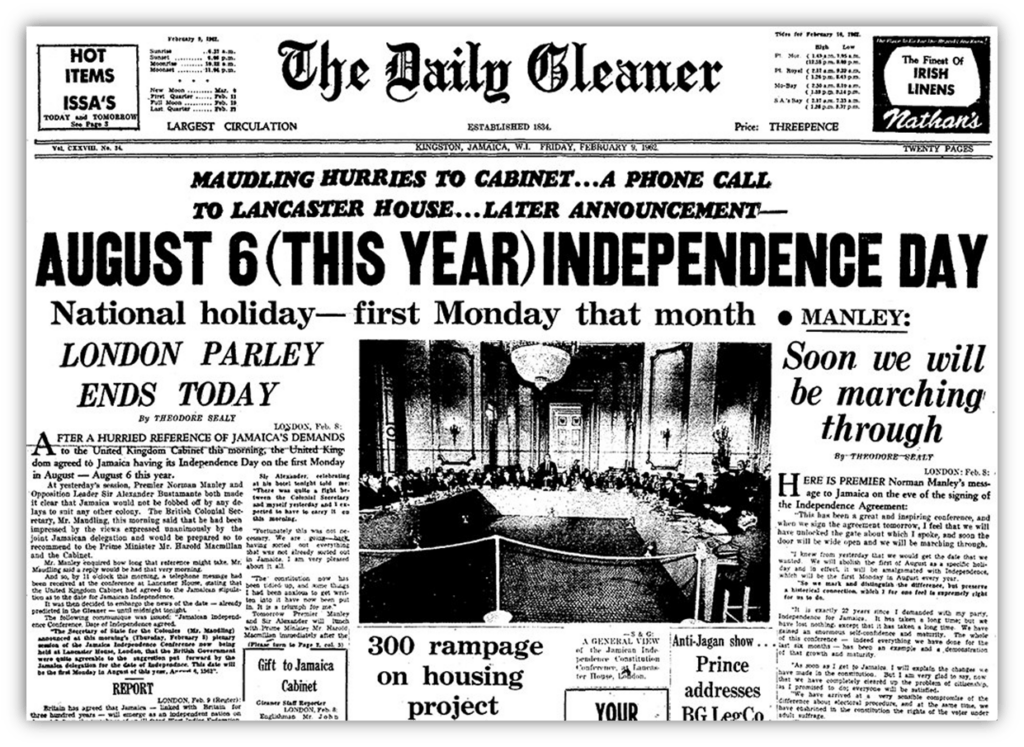
That is, until August 1962.
Jamaica gained its independence from the UK.
The transition was planned and peaceful. Princess Margaret even showed up at the celebration in Kingston. All things Jamaican, including ska, became matters of national pride.
Suddenly ska was everywhere. It had to be played at every party and on every sound system. New ska dance moves were made up. Derrick Morgan’s “Forward March” celebrated the occasion.
Coxsone Dodd was one of the more popular sound system owners. In fact, he had five of them running every night of the week. He made enough money that he could travel through the American south buying records that few other sound systems had, and he started Studio One, the first black owned recording studio on the island.
With the popularity of the sound system, musicians weren’t making much money, even with the recording they did. Some moved to London to try making a living there, however, black people couldn’t get gigs at the big clubs. There wasn’t a law against it, that’s just how it was.
So the more enterprising immigrants opened their own ska clubs. Melodisc Records recognized how many immigrants loved ska and started a subsidiary label for them.

It was called Blue Beat Records.
And “bluebeat” became a synonym for ska.
Producer Chris Blackwell came from a wealthy English family but grew up in Jamaica. As a young man, he would buy records in New York City, bring them to Jamaica, and sell them to the sound system owners, but only after recording them all on reel to reel tape.
He started Island Records, and one of his first artists was Jamaican singer Millie Small. He brought her to London for singing and dancing lessons, and they went through his tapes looking for a song that could be a hit.
Her version of Barbi Gaye’s My Boy Lollipop went to #1 in Ireland and #2 in Australia, Canada, New Zealand, and the United States.
It was the first taste of ska for a lot of the world. It’s also likely to be the only old school ska song most people know.
Back in Jamaica, a singer who went by the name Prince Buster started a sound system and a recording studio. He paid the lowest of the low classes, the Rastafarians, to record music. Rastas were seen as evil and rebellious, until Jamaica’s politics changed.
Many Rastafarians believe Haile Selassie, the Emperor of Ethiopia, was a prophet, and some that he was the second coming of Jesus Christ. When he visited Jamaica in 1966, 100,000 people met him at the airport. That number and the Rastas’ message of peace raised their status in the eyes of their fellow Jamaicans, and their touch changed the music a bit more. It slowed down a little.
Meanwhile, members of the subculture that actually was rebellious were called “rude boys.”

They were from Kingston’s poor neighborhoods, felt marginalized and wanted to do something about it.
They more or less ignored the law. Songs got rougher and lyrics often bragged about how tough the singer was.
What had been a party scene got physically dangerous in some areas.

Now, stick a pin here.
I’ll pick up at this spot in next week’s article and follow ska’s evolution into rocksteady, reggae, and dancehall. It’ll start here, around 1970.
For now, let’s follow ska.
The music was slowing down into new genres back in Jamaica, but it was speeding up in its English second wave.
As the 70s went on, first wave ska mixed with elements of punk rock resulting in faster tempos, sharper lyrics, and even more fun.
The children of the Jamaican immigrants teamed up with their white English school chums and started bands.
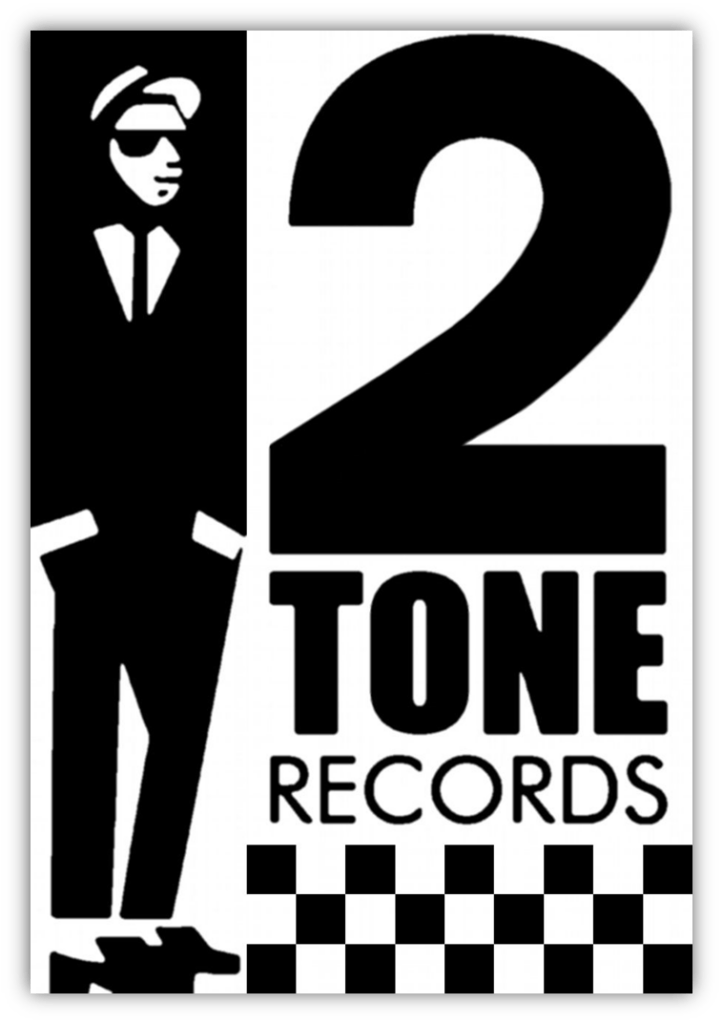
2 Tone Records became the big label of the second wave, and they got their name because most of their bands were interracial.
That’s also why they took the black and white checkerboard pattern as their logo.
To this day, it’s a symbol of ska and, by extension, racial equality.
The two biggest second wave bands were The Specials and Madness. They were both on 2 Tone. In fact, 2 Tone was started by Jerry Dammers, the keyboard player and main songwriter in The Specials.
Madness named themselves after a Prince Buster song. They’re best known in the United States for their song Our House, which isn’t ska at all. But they were huge in the UK, with top ten hits like One Step Beyond, Baggy Trousers, and House Of Fun.
Their first album, also called One Step Beyond, got to #2 and stayed on the charts for an astounding 78 weeks. Their various singles were on the UK Singles chart for a total of 214 weeks in the 1980s, more than any other artist of the decade.
Bands in the Americas didn’t seem to pick up on the ska sound until the 1990s. Aside from a new location and decade, what separates ska’s second and third waves is the ratio of ska to punk. The 2 Tone bands were about 60% ska and 40% punk. That ratio flipped in the third wave to something like 40% ska and 60% punk. The punk element moved forward so much that the third wave is often called ska punk.
American acts like No Doubt, Sublime, and The Mighty Mighty Bosstones had chart success. Other big third wave bands were Fishbone, Reel Big Fish, and Voodoo Glow Skulls. Some groups, like Operation Ivy (who later morphed into Rancid), were way more punk than ska.

Ska’s most popular period in the United States was from roughly 1990 to 2002.
That’s why some say the recent success of bands like The Interrupters is the start of ska’s fourth wave, but for a lot of the world ska never went away. There are huge ska scenes in Spain, Italy, and the Philippines, and see the Suggested Listening list below for bands from Brazil, Mexico, Japan, Australia, and Austria.
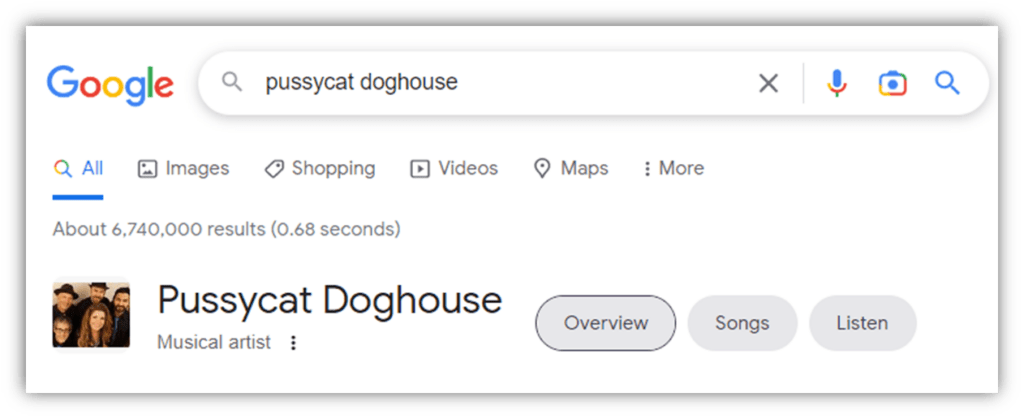
I’ll have to throw in some Pussycat Doghouse, too, because no one else is going to promote my former bands. Sorry.
Ska may be from Jamaica, a relatively small island, but it’s now global.
It’s a genre that people don’t know they like. Telling them it’s “fast reggae” gets the point across quickly, but it doesn’t really do the genre justice.
Without ska, we wouldn’t have reggae or dancehall. We’ll talk about that next week.
The people who are into ska, however, are really into it.
If you’re into ska:

you have a positive attitude

an open mind

Ska isn’t about money anymore. It’s about peace, love, hating nothing but hate…
…and dancing all night.
Suggested Listening:

Jamaica Farewell
– Harry Belafonte
(1956)

DAY OH; Linstead Market
– The Wigglers
(1956)

Enjoy Yourself
– Prince Buster
(1962)

Jamaica Ska
– Keith & Ken
with Byron Lee & the Dragonaires
(1964)

Sammy Dead (Seven Bells)
– The Hyltonaires [Hiltonaires]
(1965)

Cry Tough
– Alton Ellis & The Flames
(1967)

The Tide Is High
– The Paragons
(1967)

On My Radio
– The Selecter
(1979)

Gangsters
– The Specials
(1979)

Baggy Trousers
– Madness
(1980)

Wrong Way
– Sublime
(1996)

Enough
– Dance Hall Crashers
(1998)

Evolução
– Sapo Banjo
(2001)

Menos yo
– Sekta Core
(2010)

水琴窟-SUIKINKUTSU- feat.上原ひろみ
– Tokyo Ska Paradise Orchestra
(2010)

The Best Things In Life Are Free
– Melbourne Ska Orchestra
(2013)

Take Back The Power
– The Interrupters
(2015)

Alive
– Russkaja
(2017)
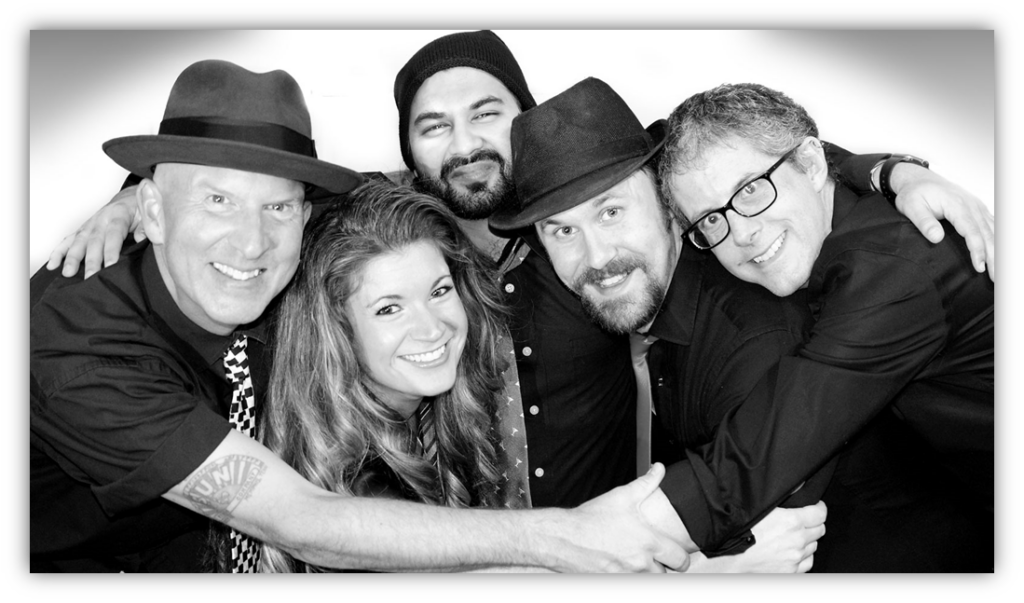
Ask For The Banana You Want
– Pussycat Doghouse
(2020)
(Let the author know that your liked their article with a “Heart Upvote!”)


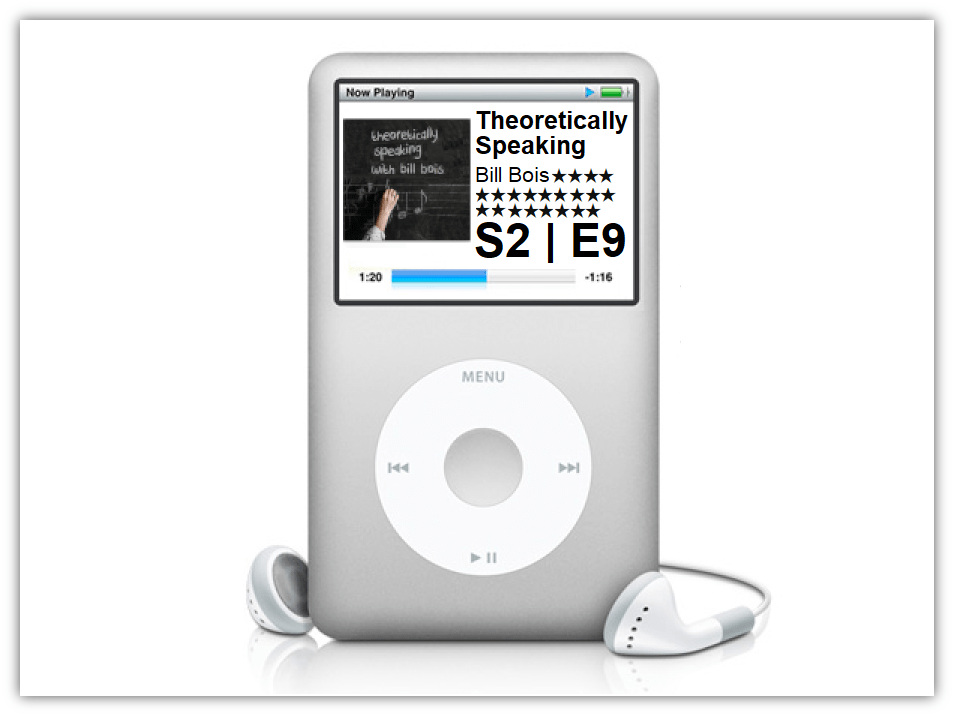
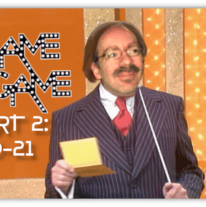
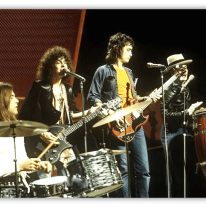
Lol, I got fooled. When I saw yesterday’s teaser line “It’s about peace, love, and hating nothing but hate,” I thought it’d be psychedelic rock, or some other hippie thing.
Ska-core was getting big when I was a teen, so it was the perfect time to get into it. And from there I latched onto and preferred the 70s/80s UK stuff. And yet a bit later I got into the 60s Jamaican stuff, and that’s still my preferred sound. Not to say that I don’t still jam to “One Step Beyond” now and again, but the original sound is just so cool.
This is prob my favorite ska track, by The Skatalites:
https://www.youtube.com/watch?v=IESqUTBrqCY
There’s also the important tie of ska with UK skinhead subculture. The rude boys of Jamaica influenced disaffected working class kids in England, and the skins modeled their dress after them, with some obvious modifications. And ska was the original sound of the skinheads, and probably remains so, at least for the strains that didn’t get caught up in nativist resentments and neo-Nazi affiliations. Skinheads Against Racial Prejudice are one more group about hating hate, hating their rival skinheads who make the world an uglier place.
Thanks, Phylum. I wanted to talk more about both The Skatalites and the rude boys but time and space didn’t permit. Some members of The Skatalites learned to play music at the Alpha Cottage School for boys. The nuns believed music would help wayward boys stay on the straight and narrow, and the music program deserves some credit for expanding Jamaican music’s popularity.
While the OG rude boys were borderline or actual criminals, the term has come to mean anyone who likes ska, at least in America. That includes Nazi skinheads but also the vast majority of us. Songs like “A Message To You Rudy” aren’t about someone named Rudolph. They’re about a rude boy.
There’s a DJ on KTUH in Hawaii who does a ska show:
ktuh.org/old-schedule/
… and his name is serendipitously Mike Rhude. He calls his listeners “Rhudies.”
Why didn’t the 80s/90s pro wrestler Ravishing Rick Rude use a ska tune as his entrance song? A missed opportunity.
This is good stuff. My knowledge of ska is frightfully small. When I think ska, I think 1) Trombone, 2) Music by the punk/alternative scene picking up island vibes. I was surprised to skim through your song selections and having to get to Sublime before hearing prominent trombone. (Perhaps I overestimated the importance of trombone).
I never heard the word ska (that I know of) till about 1991 or so when I was 21. It definitely sounds way more fun than reggae to my ears.
I’m pretty that’s just the luck of the draw. There were definitely more trombone songs that what I have here. The Specials’ version of “Rudy A Message To You” has a nice solo, for instance.
I’m going to have to do a deep dive into the examples you’ve shared, but I do have a question:
You mention the Two Tone being 60% ska, 40% punk, but the ratio reversed in the third wave. What does that mean?
When I listen to the examples, what will I hear that’s different?
2 Tone will have more horns and vocals. Ska punk will have more guitars and volume. 🙂
Here for the Madness. Remember seeing the Baggy Trousers video when I was 5, the image, the videos and the sound were tailor made for kids. Then growing up realised there’s a lot more depth in there as well. After One Step Beyond they moved away from ska to pop then maturing to comparisons with the likes of The Kinks for their storytelling songs. Very probably my favourite band ever and after a hiatus still going strong.
Love the whole 2 Tone era sound but I’m not such a fan of that 90s third wave. As much as I enjoy punk and ska separately, the punk heavy combination of the two doesn’t do it for me.
I was hoping to hear your take on it. Seems to me 2 Tone is more British and ska punk is more American (both USA and Latin American). Do you think your opinion of second vs third wave is typical in the UK?
I would say so. I can see the lineage but while ska is at the core of both waves they don’t really connect for me. Probably the hometown effect is at work, 2 Tone was very specific to the time and very British, songs like Niteklub and Ghost Town spoke to the dissatisfaction and unrest in Britain in a similar way to punk. The third wave of US acts doesn’t have the same resonance for a British audience. There is a market for them but the only one that you named that had decent commercial success is No Doubt and that only came about when they moved away from ska with Don’t Speak.
Coincidentally, I just read that the debut albums for both Madness and The Specials came out 43 years ago yesterday.
I love “Keep Moving”, especially “Michael Caine”. If you’re a hardcore Madness fan, I guess that person would feel betrayed by the band, turning their back on ska. Your comment about “Our House” made me think of my fondness for “Keep Moving”. People whose first exposure to Madness via “Our House”, I think, are the ones who champion that decidedly non-ska album. “Wings of a Dove” doesn’t sound like ska to me, but it does sound Jamaican. What am I hearing. That’s my other favorite song. So joyful.
“In the Studio w/The Special AKA”, in retrospect, was such an Elvis Costello move. That’s quite a departure from their regular style. Again, I started off with the wrong album and worked my way backwards. I heard “Free Nelson Mandela” in an independent record store, and shyly asked the cashier: “Who is that?” She misunderstood. “He’s a South African revolutionary.” Those employees, I think, lived in a bubble. Since I was there, it was presumed that I knew who Jerry Dammers was. I have a theory that everybody who knew “Free Nelson Mandela” are the only ones who bought Little Steven’s “Freedom: No Compromise”
Glad to see The Interrupters made it onto the list! Here’s another song of theirs that’s a little more ska-leaning: https://www.youtube.com/watch?v=Yq2jJLswL8I
Also, more Specials: https://www.youtube.com/watch?v=cntvEDbagAw
It was a toss up between “Fight The Power” and “She’s Kerosene,” and also “Gangsters,” “A Message To You Rudy” and “Ghost Town.” They’re all great.